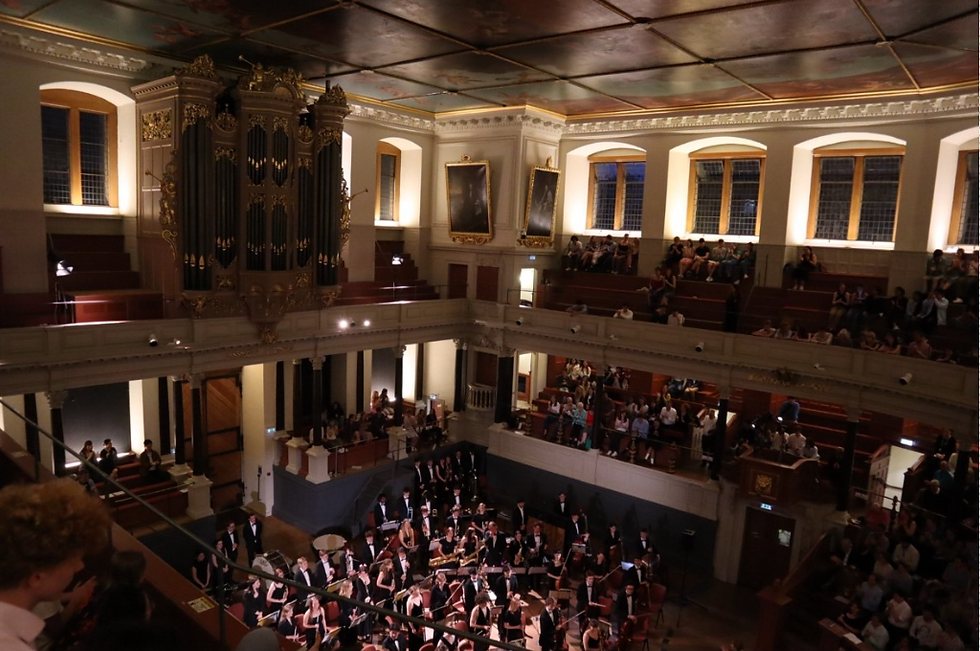REVIEW: OUWO – TT19
- Evie Brenkley

- Jun 25, 2019
- 3 min read

Lucia Švecová reviews Oxford University Wind Orchestra’s Trinity Term Concert, Symphonies for Band, which took place at 8pm at the University Church on Saturday 15th June 2019
On Saturday evening, the Oxford University Wind Orchestra once again proved its versatility in the choice of repertoire and created a wonderful sonic experience for the full and excited audience. In contrast to their last term’s concert, which introduced repertoire from all around the world, this time the repertoire was more Western-focused, including standard composers such as Stravinsky, Bernstein, and Gershwin. It was an advantageous choice in attracting more standard audience which then could also hear works by contemporary composers, such as John McCabe and Nigel Hess. The last piece on the programme, Persichetti’s centrepiece of the symphonic works for a wind ensemble, as the programme notes inform us, confirmed that this concert was intended to represent a standard Western wind repertoire. Even though I personally miss OUWO’s traditional introduction to less famous non-Western repertoire, in this particular instance, it was perhaps a beneficial change which ensured popularity also with the more conservative part of the audience. First two works, Stravinsky’s Ebony Concerto and Bernstein’s Prelude, Fugue, and Riffs, introduced Tom Carr as a soloist, accompanied by a smaller ensemble. Unfortunately, the Ebony Concerto did not allow Tom to shine as much as he would deserve, but this was well-balanced by the Bernstein where he demonstrated his virtuosity, truly comparable to the “King of Swing”, Benny Goodman. Nevertheless, the Stravinsky offered a show-case opportunity for the brass section, which produced some impressive sound. On the other hand, the down-side of such sound was that the guitar and harp were almost inaudible. Bernstein’s Prelude, Fugue, and Riffs presented OUWO with an opportunity to play some proper jazz, and it was very skilfully managed! The jazz rhythms were seamlessly transforming from a faster dance mood to a more swaying atmosphere. Even though in places the trombones slightly overpowered the texture, the percussion section had the truly important role in creating a swing impression. After Tom’s virtuosic solo, all players demonstrated their almost equal virtuosity and made the audience swing in the groovy rhythms. The conductor, Chris O’Leary, showed an admirable richness of changing character, which, combined with his utmost clarity, not only facilitated the performance of the orchestra but was also enjoyable to watch.
The first half of the concert finished with Gershwin’s famous American in Paris. The wind-band texture was slightly overpowered in lower registers, but the familiar melodies still shone nicely in the wide texture. The lyrical trumpet solo clearly stood out and dictated the lyrical character of the whole following section. Chris’s smooth transitions between contrasting sections gave the piece its unity, and he once again portrayed great character in emphasising the majestic expression of the closing section by conducting without the baton. An equally exquisite management of contrasting moods was demonstrated in Persichetti’s Symphony No. 6 ‘For Band’ at the end of the concert when especially in the final Vivace the moods were changing rapidly from playful character to more majestic sound in contrasting detached and legato sections.
The second half of the concert featured more contemporary repertoire, providing a nice balance to the programme. The programme notes to McCabe’s Canyons offered the audience a bit of analytical insight which enhanced their focus and appreciation of the less-known work. This piece represented a show-case for the trumpets, allowing the players more freedom from the side of the conductor. Overall, the orchestra achieved a true sonic effect of echoes in the canyon landscape, which produced a psychologically powerful impression. However, this was mostly achieved simply by timbral effects whilst the orchestra encountered some problems in tuning and some of the lines were perhaps a bit more disjointed than the composer intended. Nevertheless, after this Hess’s Lochnagar Suite presented more lyrical melodic material which was clearly mastered. In this number on the programme, OUWO introduced its Assistant Conductor for Trinity term, Zhenling (Jordan) Wang. Jordan was good at maintaining contact with different players and sections of the orchestra, but his conducting style was less varied in character. He showed more character when he was not using his baton in the second movement, although that might have provided a bit less clarity.
On the whole, the concert was a clear success and the performance was thoroughly enjoyable, even though I do hope that the future concerts will again contain more non-Western repertoire. Finally, we wish OUWO all the best for the coming year.







Comments